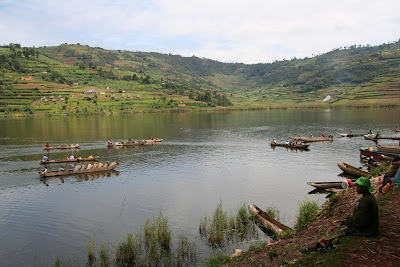AFTER living in Uganda for nearly eight months, I have managed to keep my social faux pas to a minimum. I was not always socially aware and I am sure I insulted more than one person after my arrival.
The first thing I got used to was a handshake that lasted an entire conversation. One of the administrators at the hospital where I was staying introduced himself to me and we shook hands. I started to let go, but he held firm. Jerking my hand away seemed rude, so it just hung there.
Now, I find myself doing the same to other bazungu (white people), until I notice the look of curiosity on their faces.
The biggest mistake I made was refusing food.
I had not been feeling well and the amount of food piled on the plate was too much. I politely said “No, thank you, maybe I can have some later.” What would have been perfectly acceptable back home, led to the longest lecture I have received on how rude it was.
The cook’s anger and hurt lasted two days. I learned never to refuse food.
A couple of secrets I learned for dodging food:
l Sitting near children. Most of them are willing to eat a little more matooke (green bananas) or chicken.
l Helping yourself in a buffet style setting.
Another of my early mistakes was buying food and eating it on the go. In Canada, it is common to have coffee or tea in a mug on your way to work as you munch a biscuit or bun.
One woman said: “Boy, you must be hungry.” I smiled and replied that I was. Then a friend told me it was not okay to walk and eat. I was embarrassed.
A custom I found easiest to adapt to was eating with my hands.
In Canada, I am always picking at my meals with my fingers and my mother smacks my hands. Imagine my delight when I realised it was okay here!
There have been other things that, with time, I have subconsciously adapted to.
Back home, I could be described as a feminist. Here, I learned that Baganda women are expected to kneel when greeting older, respected relatives or their husbands.
Initially, I was outraged, but as time passed, even I involuntarily drop to my knees. If I cannot, for example, in a taxi, I lower my head. However, when I see a young woman on her knees in the mud, my inner feminist cries.
The most difficult cultural difference to get used to is how body shape and size are viewed. I am not huge by any standard, but I am tall and not a size two, which due to a North American upbringing, makes me sensitive to my size.
Comments such as: “Wow, I bet your mother is as huge as you are,” which I received from a well-intentioned friend, cannot be taken as a compliment. To be larger here is not necessarily a bad thing.
My male Ugandan friends say I am a good size and many Ugandan men would love me. And trust me, they do. While walking downtown, they call out: “Muzungu, you’re my size.”
The final thing I got used to was not getting worked up over things in public. If I was manhandled or spoken to at home the way I am here, I would lose my temper and tell the person off. Here, I was taught to hold my tongue and walk past.
This is unfortunate as the average boda boda rider would receive some choice comments from me. “No, it is not okay to run a red light at Clock Tower,” and “I know the cost from the Old Park to Nandos isn’t sh5,000,” don’t quite sum up the frustration I am feeling.
























